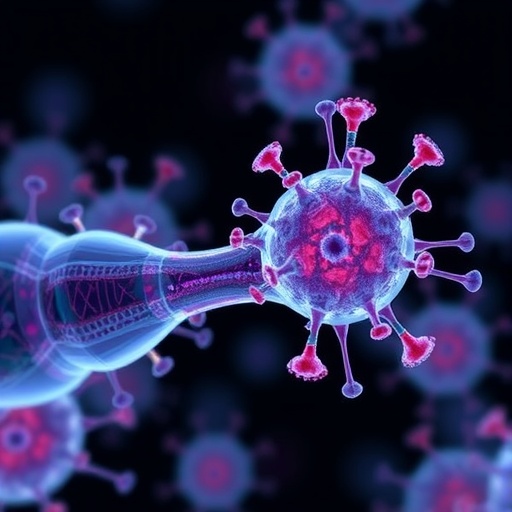Chimaeric antigen receptor (CAR) natural killer (CAR-NK) cells signify a revolutionary stride in the realm of immunotherapy, presenting a compelling alternative to the traditionally employed CAR-T cells. Their application is underscored by the urgent requirement for effective cancer treatments, leading researchers to explore innovative methodologies for generating robust immune responses capable of combating malignancies. One of the primary challenges prevalent in the current clinical landscape is the need for high-dose CAR-NK cell infusions that ensure sustained therapeutic efficacy. This necessitates the establishment of efficient, scalable production techniques for these potent immune agents.
Recent advancements in cellular therapy have spotlighted a novel three-step strategy aimed specifically at enhancing the yield of induced natural killer (iNK) cells and CAR-engineered iNK cells derived from human umbilical cord blood. At the root of this innovation lies the utilization of CD34+ haematopoietic stem and progenitor cells (HSPCs) extracted from umbilical cords. This unique approach leverages the inherent qualities of these stem cells to create an abundant source of functional iNK and CAR-iNK cells, critical for bridging the gap between laboratory research and clinical application.
Starting from a single unit of umbilical cord blood rich in CD34+ HSPCs, the implemented methodology boasts an impressive capacity to generate millions of mature iNK cells and CAR-iNK cells. Specifically, the protocol yields between 14 to 83 million mature iNK cells and 7 to 32 million CAR-iNK cells, both of which demonstrate significant expression of CD16 and CAR markers. Notably, the process ensures undetectable levels of T-cell contamination, a substantial advantage for the purity and safety of the resulting cell therapies.
The implications of these high yields extend well beyond quantitative metrics; both freshly harvested and cryopreserved iNK and CAR-iNK cells have exhibited formidable anti-tumor activities against an array of human cancer cell lines. These findings align with the ongoing exploration of iNK cell capabilities in overcoming multiple cancer types, further solidifying their role in modern immunotherapy. Preclinical assessments indicate not only the tumor-targeting proficiency of these cells but also their potential to prolong survival in human tumor-bearing animal models, which is critical for validating their effectiveness before human trials.
A striking feature of this new production technique is its cost-efficiency, which could democratize access to advanced cellular therapies for cancer patients. The affordability of this approach, combined with its capacity to produce large quantities of CAR-NK cells, presents a game-changing opportunity. As the landscape of cancer treatment continues to evolve, reducing production costs while maintaining or enhancing cellular efficacy becomes paramount for broader clinical adoption.
Addressing manufacturing challenges is essential for translating these findings into clinical practice, as conventional methods often fall short in terms of scalability and cost-effectiveness. The innovative three-step strategy not only mitigates these issues but also provides a streamlined framework for future research and development in CAR-NK cell therapies. Researchers are optimistic that this technique will pave the way for expanded therapeutic applications, ultimately contributing to the fight against cancer.
Moreover, as clinical trials for CAR-NK cells progress, the necessity for continuous improvements in yield and functionality remains at the forefront of research endeavors. The insights gathered from recent studies indicate a positive trajectory, where advancing technology and improved methodologies can spawn a new generation of immune cell therapies. These developments hold promise not only for enhancing patient outcomes but also for reshaping the methodologies surrounding immune system mobilization and tumor eradication.
The transition from bench to bedside is fraught with challenges, yet the progress demonstrated in the large-scale generation of iNK and CAR-iNK cells elucidates a roadmap for future innovations. Enhanced understanding of the biological mechanics underlying cellular functions will further inform the design of engineered cells, allowing for customization based on patient-specific tumor profiles. This level of personalization heralds a new era of precision medicine, fostering improved treatment paradigms sensitive to individual patient needs.
As the scientific community continues to unravel the complexities surrounding cell-based therapies, the findings surrounding CAR-NK cells derived from umbilical cord blood mark a significant milestone. The potential for these therapies to redefine cancer treatment underscores the relentless pursuit of creating effective, accessible solutions for even the most challenging cancers. With each step in this unfolding narrative, the hope of providing functional cures grows stronger, encouraging further exploration into the possibilities these cells hold.
In conclusion, the innovative method for producing iNK and CAR-iNK cells from CD34+ HSPCs not only enhances our understanding of natural killer cell therapy but also sets a precedent for future research in the domain. As we stand on the cusp of breakthroughs in cancer treatment, the implications of this work are vast, potentially offering new life avenues for countless patients battling cancer. The unfolding narrative of CAR-NK cells promises a transformative impact on oncological care, with each advancement propelling us closer to a future where cancer may one day be a manageable condition rather than a terminal illness.
Subject of Research: Generation of CAR-NK cells from CD34+ HSPCs for cancer immunotherapy.
Article Title: Large-scale generation of iNK and CAR-iNK cells from CD34+ haematopoietic stem and progenitor cells for adoptive immunotherapy.
Article References:
Hu, F., Li, J., Wang, Y. et al. Large-scale generation of iNK and CAR-iNK cells from CD34+ haematopoietic stem and progenitor cells for adoptive immunotherapy.
Nat. Biomed. Eng (2025). https://doi.org/10.1038/s41551-025-01522-5
Image Credits: AI Generated
DOI: 10.1038/s41551-025-01522-5
Keywords: CAR-NK cells, iNK cells, immunotherapy, CD34+ HSPCs, cancer treatment, adoptive cell transfer, clinical trials, cell engineering, tumor immunology.




